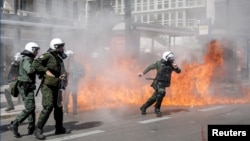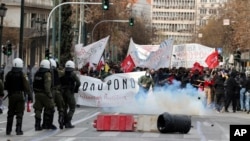Violent protests erupted in Greece Sunday as thousands of people took to the streets to demand answers from the government about a train collision that left 57 people dead, scores injured and an undisclosed number missing last week.
The protests came as Prime Minister Kyriakos Mitsotakis apologized for long-running flaws in the state’s railway system. But it’s seen as unlikely that his apology will placate the growing anger and frustration.
In Athens, what started as a peaceful demonstration by railway workers, students, and thousands of others quickly descended into violence as protesters clashed with police outside the parliament building.
Black-clad militant youth pierced through protesting crowds, hurling sticks, stones and gas bombs at parliament. They set dumpsters and police cars ablaze, forcing thousands of demonstrators to flee.
Riot police chased the mobs of youth across the capital, firing several rounds of tear gas that had protesters and bystanders coughing and choking from thick plumes of smoke that quickly cloaked the Greek capital.
Six people were detained, five of them arrested.
The violent protest in Athens, though, was not the only one.
Since the tragic train crash — the deadliest in living memory here — rolling protests have gripped Greece with demonstrators, largely youth, venting their anger and frustration at the state for what they say is a repeated show of negligence concerning major infrastructure projects. In Athens, protesters waved banners bearing slogans critical of the government and released 57 balloons – one for each victim.
In the northern Greek city of Larissa, not far from the site of the crash, demonstrators targeted the state railways company and the station where a train master authorized the conductor of a freight train to remain on the same track as a passenger train, realizing his mistake 12 minutes later when the deadly collision occurred. About 350 people, many of them university students, were on the doomed passenger train.
On Sunday, the 59-year-old station master appeared before a prosecutor to be formally charged with negligent manslaughter.
The government of Prime Minister Kyriakos Mitsotakis blamed human error for the crash. But enraged Greeks, led by students and train workers, say the state is largely to blame, failing to fix the country’s small but outdated and dangerous rail network for decades.
As protests spread across the country, Mitsotakis tweeted a personal apology. It appeared to have little impact on public opinion.
“We are untouched by these apologies,” said Dimitris Koutsoumpas, the leader of the Greek communist party that has been helping organize many of the demonstrations. "We will remain here by the side of the workers and the students demanding full accountability.
Following Sunday’s violent protests, some 400 demonstrators holding black flags and black balloons returned to the courtyard of the Greek parliament, staging a silent sit-in. They vowed to stay for as long as it takes to seek justice for the 57 victims.





